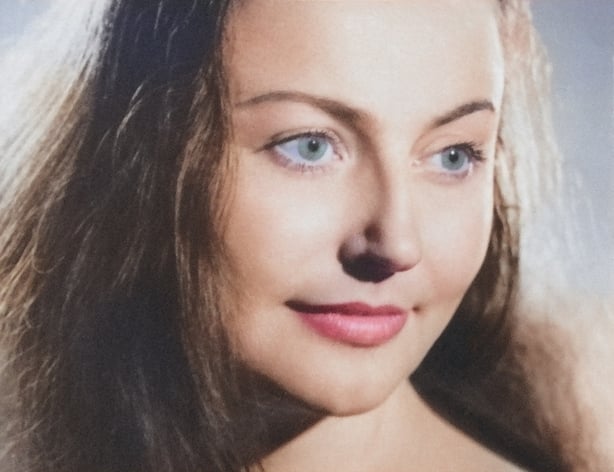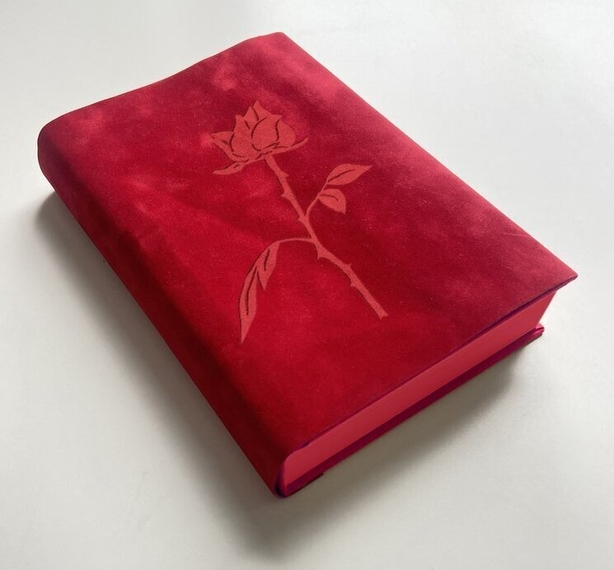Full-page photographs punctuate the written parts of Dragana Jurišić's book like studs holding the story together, as essential to the text as the words.
At the start: a rook on a metal fence, a blood-streaked ankle with rivulets pooling red on a hospital floor. It’s a story that begins with a miscarriage in Dublin, "the cradle of death inside me". It loops back almost immediately to memories of others with depression, dementia, catatonia, but the first chapter, Twins, is succinct, strong, and present like a shoulder-thump to the heart. It ends with the words: "They were perfect," she says. "Don’t know what went wrong." This seems like a starting point of sorts for a manifesto for Jurišić’s memoir-autofiction-family history, and perhaps for the art of this artist, who is primarily known as a photographer in Ireland where she has lived since 1999.
Like any good memoir, this book has a hook and a structure of its own. The hook is that Jurišić is looking for information about her mysterious late aunt, Gordana. The structure unfolds in glimpses like receipts slid from envelopes hidden in a handbag in the wardrobe, or notes kept under the bed. Jurišić is seven, in Croatia, and finding a crown of thorns in a priest’s bedroom. She tries it on: more blood. "Just like Gordana," her mother says. The author appears in photographs, reflected in polished gravestone, shimmering behind textured glass, fragmented in a broken, graffiti-marked mirror.
Her Own is a book that reveals itself in flashes.
Gordana Čavić (1933 -1987) was buried in a lead-sealed coffin. Jurišić is twelve at the funeral. Her aunt was beautiful, everyone agrees. "It was like she was her own creator," cousin Rade says after climbing out of the grave he has dug for her. This too reads like an artist’s impulse. The book’s title invites more ways to finish the sentiment: her own kind, her own life, her own story, her own truth, her own way; Dragana’s and Gordana’s own individuality, insistently kindred across time. Her Own is a book about death and home, longing and love, environments and events that grind us down. "Are gravitational forces stronger in the Balkans?" Jurišić asks as she describes Croatian women in her mother’s hometown, walking the street with their backs humped.
Drinking šljivovica plum liquor in an annex of Gordana’s childhood home, Jurišić discovers not everything was burnt in the kitchen range after her aunt’s death. She pays the couple who live there for photographs, curled and stuffed into an empty chocolate box, handkerchiefs and a Fuji Single 8 Camera with film rolls and a projector. "I’m thinking of writing about Gordana," writes Jurišić with pleasingly circularity, because this is what she tells them, and this is what she has now done.

The photos appear in the book, unfurled, examined, employed by this artist-niece-biographer-autobiographer now as part of her hook. Jurišić has made a physically and texturally exquisite book, like a bible, published in a limited edition of 670: hardback, with a red flocked velvet velour cover embossed with a single rose; weighty pages, stitched and bound; richly illustrated.
Gordana married three times before she turned thirty. Jurišić begins an act of ventriloquism about a third of the way through Her Own, writing in the voice of her aunt: "no man would ever walk away from me. I will be the one doing the walking." Gordana escaped the village of Kućanci, first to Belgrade and on to Paris in 1956. Her cousin and best friend Milanka should have accompanied her to France, but stayed in Serbia for a man. Aged 6, Jurišić was sent to Milanka in Belgrade, "for disciplining". Her own story starts with the end of relationships: with her unborn twins, her then husband, herself. It makes sense that a photographer would write of and with photography as a conduit, or a kind of formaldehyde, for memory. She goes next to Milanka, still alive, and Jurišić’s eldest aunt.
Like any good memoir, this book has a hook and a structure of its own.
Her Own contains photos old and new. Text and photograph meet, facing each other across pages like companionable friends. "Milanka straightens her black blouse covered in white dots," Jurišić writes. "A slight tightening of the jaw, and the sharpening of her irises." The photograph she has taken is exactly that. "You should leave that story alone," Milanka tells her. But the artist is not so easily dissuaded from her task.
Her Own is a book that reveals itself in flashes. Jurišić aged 17 standing on a balcony at home in 1992 during a ceasefire as a bomb hits. Body parts, groceries, everywhere. Running to locate her brother. Decades later, wandering Paris alone in search of clues, and finding instead the Canadian writer Margaret Atwood, scribbling fast, propped between two chairs in the Jardin du Luxembourg. "Paris is brimful of dreamers," Jurišić writes.
There are affinities here with recent memoirs including Doireann Ní Ghríofa’s A Ghost in the Throat, Tanya Shadrick’s The Cure for Sleep, Elizabeth Boyle’s Fierce Appetites and more, in that Jurišić is a writer writing a book about writing a book while searching for some version of herself. This is a divorce story too, although a subtle one, because divorce can cause identity to shatter, and can require a quest to identify a new one, or perhaps retrieve an older version of self. "So, you will always be alone," Jurišić’s mother says to her when she comes home for Christmas.
Jurišić, ventriloquising Gordana, writes, "I was done with men. It made my work life easier." But what was Gordana’s work? How did she make a living? "There were many men, you know… mysterious phone calls." The closest Jurišić gets to an answer is "whatever-she-had-to-do-to-survive". This beautiful book ends abruptly, just as it began. It plunges the reader into a rich, complicated world and then lifts us right back out again, breath slightly knocked. There is no neat story to be found, no clear-cut new identity to be forged, and that feels counterintuitively apt. The final image is a photographic one, of the artist, the author, holding a cat: both wild, intense, determined-looking, ready to escape, like Gordana.

Her Own is available directly from the author's website - find out more here.


